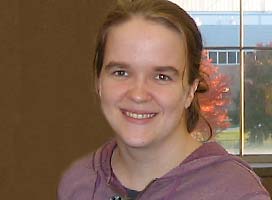

Venture Boldly

Office of Communications
2 East South Street
Galesburg, IL 61401

Knox College student Eleanor Poley recently won first place in a computer science research competition. Poley's project, "RUMU Editor: A Non-WYSIWYG Web Editor for Non-Technical Users" received the first place award for undergraduate research at the Conference on Human Factors in Computing Systems, sponsored by the Association for Computing Machinery.
 Poley is a senior computer science major from Englewood, Colorado.
Poley is a senior computer science major from Englewood, Colorado.
Poley's project advanced through three rounds of competition. Her work was one of just 11 undergraduate projects chosen for a poster display at the conference, and one of only three that was chosen for general presentation in a regular session of the conference.
"Ellie's research required serious software prototyping and development and involved a couple dozen Knox students in usability testing," said Don Blaheta, assistant professor of computer science, who served as Poley's faculty advisor for the project, which has won College Honors in computer science. The 28th Annual Conference on Human Factors in Computing Systems was held in April in Atlanta, Georgia.
Poley's project refers to the method of editing web pages known as "WYSIWYG," an abbreviation of "What You See Is What You Get." WYSIWYG allows users to directly edit a page's appearance, but the convenience comes with problems, Poley says.
"WYSIWYG editors generate web pages that are complex, take longer to load, are harder to maintain, and do not comply with standards, such as those for people with disabilities," Poley says. "They also encourage users to focus on the presentation of the web page, not the content."
"Ellie's work is an attempt to radically rethink the standard WYSWIG interaction paradigm for untrained users to begin to develop websites," Blaheta says.
"Her project is clearly well received by the computer science community, and she plans to continue development on the software after graduation," Blaheta says. "It could lead to a better understanding of the conceptual structure of a webpage and provide a new avenue to draw kids into computer science."
Poley, who graduates in June, recently accepted a position in software engineering with Adobe Systems, Inc. "Learning computer science at Knox was much more for me than a technical education," she says. "I learned problem-solving skills and ways of thinking that have served me in my interdisciplinary studies and non-academic pursuits. I know this education will serve me no matter what I choose to do."
Poley is the 2010 winner of Paul's Prize in Computer Science, an award given by Knox to a graduating senior who has shown potential for a distinguished career in computing or computer science. Last October, she was a member of Knox's student computer programming team that competed at the regional Intercollegiate Programming Competition, held by the Association for Computing Machinery at the University of Illinois.
Founded in 1837, Knox is a national liberal arts college in Galesburg, Illinois, with students from 45 states and 48 countries. Knox's "Old Main" is a National Historic Landmark and the only building remaining from the 1858 Lincoln-Douglas debates.
Published on June 01, 2010